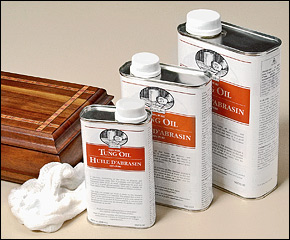
This product was show to me by a Bass Player. He was asking me what to use on his old Fender Basses. They appeared to be drying up and needing oiling or something. This guy has quite a collection: Wal, Fenders of every type, Alembics, Modulus Carbon Fiber, lots of nice basses.
He mentioned the above product which he got from a clock restorer. He wasn't sure he should use it. I was unsure. What I told him was that I'd bring everything I had over for him to try. I also took him an orphan Bubinga back, fairly smooth right off the bandsaw.
We labelled up the sample and applied all the products. 1. FeedNWax 2. Thick and Heavy Mineral Oil (per Frank Ford) 3. Kyser Lem-Oil 4. Petros Fingerboard Treatment 5. Gibson Fretboard Conditioner
Here is how it looked after one day on the bare bubinga surface.
Totally evaporated and looking completely bare, Kyser, and Gibson.
The Oiliest product and still present on the wood, Mineral Oil, which made the wood look darker.
Second was the Petros Fingerboard Treatment. It too kept the wood looking darker. It did not go away. Matter of fact, I can't put my finger on the ingredient, but if you smelled it, you'd know you had smelled it before. I'm guessing linseed or tung oil or something of that nature. The product will get a skin around the snap pour spout. I just don't know what it is.
Finally, the FeedNWax contains Orange Oil, Carnauba wax and Bees Wax. It looked fairly nice really. Much less dark than Petros or Mineral. It really made me wonder about the possibility of using it. I don't have any but plan to pick some up and found it's available locally. www.howardproducts.com for the dealers in your area.
Today, not having that product I was asked to treat the fretboard on a HD28VR Martin four years old. It was in the shop for a bridge reglue. I took my bottle of Kyser which was 1/3 empty and poured in some Mineral Oil. Reading the lable, the Kyser product is mainly naptha. Hopefully they are compatible? Anyway, the thinner product floated nicely across the ebony board and bridge. I let it sit for a couple minutes to soak up any it would, then it seems wiped most of it away. Left a nice sheen/satiny surface.
Oh, and I forgot, the Mineral Oil is good for a laxative too? Mine's out of date though....








